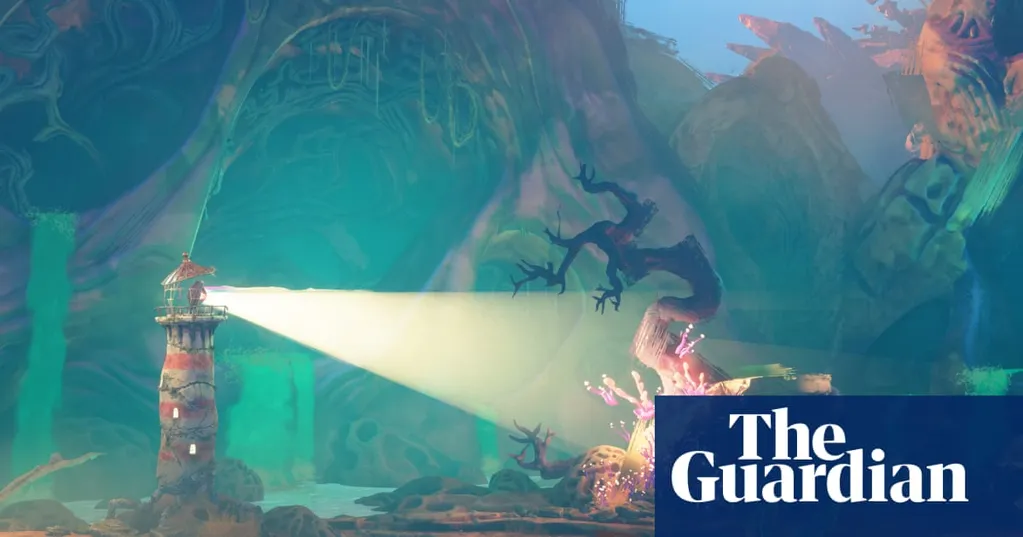Double Fine's latest is a whimsical action-adventure that takes inspiration from real-life biology as much as cult fantasy movies from the 1980s.
Keeper is staking a bold claim to be the oddest game ever published by Microsoft. The setting is weird: an iridescent, far-future imagining of New England where organic and non-organic matter mingle in strange, alchemical ways. And the characters are undeniably quirky: one is a bird called Twig whose beak is made from driftwood. Strangest of all: you play as a lighthouse that has inexplicably become animate, sprouting tiny, spindly little legs to carry its wibbling, wobbling body.
In the sea of action-hero young men and, to a lesser degree, women, the lighthouse stands out as an unlikely star. Creative lead Lee Petty is a little fuzzy on the details of how it came to be. Rather, he talks about the creation of the protagonist as he does the broader action-adventure experience: as if it rose out of his subconscious. Despite the ostensible absurdity, Petty believes there is a certain intuition about it. “You have a light, and light has a very strong connection with life,” he says. “You can imagine the verbs for the player, and the actions, puzzles, mechanics that fall out of that.”
The lighthouse’s illuminated beacon is the primary way you interact with the game’s teeming island setting. In “unfocused” mode, you direct the beam about a fantastical environment, causing foliage and small creatures to grow, change and morph. In “focused” mode, the light’s power is concentrated: larger objects undergo transformation while some materials are repelled or attracted; this is the basis of the game’s more involved puzzles.
Keeper's world is one of gauzy, psychedelic purples and deep, verdant greens. We see bioluminescent rock formations, tree-sized tendrils protruding from their gigantic flower heads, and a gorgeous, whale-like creature floating through the sky, vegetation growing unexpectedly on its back. This ecological extravaganza is partly inspired by 1980s fantasy movies such as The Dark Crystal and The NeverEnding Story, “weird” and “imperfect” works, admits Petty, yet “so earnest in their desire to create a world that you haven’t seen before”.
Real life proved just as inspiring for the creative lead. During Covid lockdowns, he walked alone in the pretty foothills south of his San Francisco home. Petty gazed at the abundant vegetation while meditating on what the planet might look like should humanity cease to exist. He was also reading books and watching movies about mycelium networks, thinking deeply about the interconnectedness and interdependence of ecosystems.
This deluge of feelings, real-world circumstances and reference material coalesced as a fever dream, says Petty. He envisioned a “a weird island, a sort of surreal, post-human thing, where life has continued to evolve in completely unexpected ways”.
The game’s genesis arrived shortly after Petty’s award-winning employer Double Fine, maker of trippy platformer Psychonauts 2, Stacking and many other idiosyncratic titles, was acquired by Microsoft. The new management was receptive to his experimental idea: he was given the time and resources to explore the concept before locking down its form. Keeper seems to have embodied the laid-back approach of its making: the vibe is languorously dreamy with many opportunities to slow down and smell the enchanting and totally bizarre roses.
“You’re not rushed along, you’re not given mission objectives. There are no pop-ups on the screen with meta-rewards,” says Petty. “You’re kind of left to dwell in the space.”
And yet there is a grim irony that may yet sour this sweet, whimsical experience: Keeper's vivid celebration of life is being funded by Microsoft at a time when the company's cloud-based storage platform Azure has been used to facilitate the preparation of deadly airstrikes and military operations in Gaza and the West Bank. The Boycott, Divestment and Sanctions (BDS) movement has called for the boycott of Microsoft and Xbox products. Recently, unionised workers at French studio Arkane, also owned by Microsoft, issued an open letter stating that its parent company "has no place being accomplice of a genocide". Microsoft has since claimed to be investigating the use of its platform in this manner, which is, it claims, a breach of the terms of service.
Petty, of course, is far removed from the decisions made by his bosses at Microsoft, and he stresses as much. He says this is the "downside" of being owned by a much larger organisation, one whose purview extends far beyond entertainment. "I'm not in control. Double Fine is not necessarily tacitly endorsing anything of our parent company," he says. "We're just trying to make great games."
